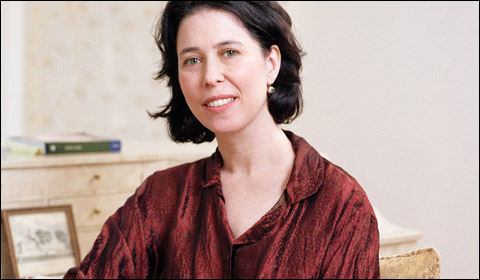
HOME COOKING: Cambridge novelist Allegra Goodman gets into love, work, and commitment in The Cookbook Collector. |
Planning to be lazy and let it all go this summer? Sorry, there are too many good books to read. From Allegra Goodman's The Cookbook Collector to Richard Rhodes's The Twilight of the Bombs and Jean Valentine's Break the Glass, you'll find tomes galore to keep you occupied through Labor Day.
Fiction
Summer opens with the latest from DAVID MITCHELL, who — unlike a lot of people — never writes the same novel twice. Set in the late 1700s on Dejima, a Dutch East Indies Company outpost in Nagasaki Bay, The Thousand Autumns of Jacob de Zoet (Random House, June 29) stars a young Dutch merchant unexpectedly changed by his encounters with Japanese culture. Cambridge author ALLEGRA GOODMAN explores issues of love, work, and commitment through the lives of two very different sisters in The Cookbook Collector (Dial, July 6). In HOWARD NORMAN's What Is Left the Daughter (Houghton Mifflin Harcourt, July 6), a father aims to smooth relations with his estranged daughter by confessing a long-kept secret.
Family issues continue to surface throughout the summer. In MONA SIMPSON's My Hollywood (Knopf, August 3), Claire, a composer newly arrived in Los Angeles with her scriptwriter husband, comes to depend on a Filipino nanny struggling to pay for her children's education back home. Whiting Award winner LILY KING's Father of the Rain (Atlantic Monthly, July 6) features an adult daughter torn between pursuing her dreams and helping her estranged alcoholic father.
And sometimes the personal is political. In ELIE WIESEL's The Sonderberg Case (Knopf, August 24), when the title character is accused of murdering his uncle in upstate New York, he proclaims that he is "guilty . . . and not guilty," setting the stage for a deep moral reckoning regarding the Holocaust. In PER PETTERSON's I Curse the River of Time (Graywolf, August 3), with his wife having left, his mother terminally ill, and the Berlin Wall falling (after he's spent years trying to ingratiate himself with the Communists), Arvid Jansen admits that he's made all the wrong choices. In GILES FODEN's Turbulence (Knopf, August 17), set during World War II, efforts are afoot to find Wallace Ryman, a pacifist scientist whose work on predictability will help with weather forecasting as D-Day approaches. Foden is especially noted for his novel The Last King of Scotland. GARY SHTEYNGART envisions a dark new America in Super Sad True Love Story (Random House, July, 27), while RICK MOODY takes us all the way to 2025 in The Four Fingers of Death (Little, Brown, July 28), whose protagonist is writing a novelization of the remake of a 1963 horror film.
In Freedom (Farrar, Straus, August 31), JONATHAN FRANZEN depicts the decline and fall of the idealistic Walter and Patty Berglund; their son has gone Republican, and Walter now works for Big Coal. For those who loved TheHistory Boys (and, secretly, Harry Potter), there's PAUL MURRAY's Skippy Dies (Faber & Faber, August 31), a tale of odd doings at Seabrook College, Dublin, that's a huge success in the UK. Finally, in National Book Award winner JULIA GLASS's The Widower's Tale (Pantheon, September 7), Percy Darling gets out of his shell when he lets his daughter set up a progressive preschool in his barn.